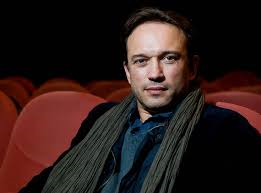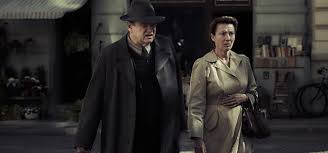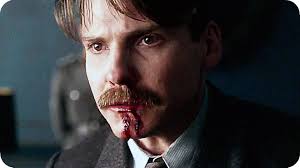
Berlin, in the middle years of World War II was a place of outer strength and inner fear. Ordinary Germans were beginning to realize that Hitler’s monstrous policies had to be stopped but it was not possible to rally opposition. To step out of line against the Nazi regime was a death sentence. One working class couple Anna and Otto Quangel (Emma Thompson and Brendan Gleeson) lost their only son fighting for Germany and it pushed them to action. They devised a secret scheme to expose the truth of the Third Reich, hiding untraceable cards with defiant messages and calls to action around the city. It was an impressive plan that they carried out for two years, 284 cards delivered. But an eager Nazi officer played by Daniel Brühl was obsessed with finding them, obsessed to the point of madness. We spoke with French actor and heart throb Vincent Perez who wrote and directed Alone in Berlin. He was in New York.

Alone in Berlin is the true and tragic story of two heroes. What was it that pushed you to write and direct this film about them?
They very close to the history of a lot of people we don’t really talk about, those people who fought with their weapons and will against this machine this Nazi machine the extremist machine. I went back to my own story, my family’s story. My mom is German and I researched her history and I discovered things that would relate to those characters. My father was Spanish and my grandfather was killed by Franco. This is the story of so many people all over the world during that time. The Germans had to choose between communism and Nazism and people didn’t want either. Some would throw sand into the Nazi war machine. That’s what attracted me to place myself into the minds of those ordinary people to show that everybody can do something. Throw those grains of sand into those machines in order to make them stutter and stop. It could be an individual that will change things.

Extraordinary cast Emma, Brendan and Daniel. Emma and Brendan must appear calm while experiencing unspeakable terrors while Daniel’s character has to seem sane.
All of them arrived with their own energy. Emma’s more manic than Brendan, she goes for it and jumps into the acting, and dives into it without protecting herself. To me she is a warrior. It was about holding her. She was wonderful “toning” herself with Brendan Gleeson in performance. It was beautiful to see that. Brendan had a very different pace and energy. He’s a quiet man, someone who must understand how things work. He is more cerebral, he keeps things for himself and he has a great capacity for always being right. There is nothing to throw in the garbage and it’s very impressive to see that. It’s wonderful getting to work with those totally different actors. Their two energies gave the film this particular pace. They were balanced.

Daniel Brühl was astonishing as a Nazi official. He was abused by the Reich and abused others, even though he seemed to have a conscience.
I loved working with him because he is very subtle. His part I could relate to, he is us, the one that will break under the pressure of the huge Nazi machine so he’s a human guy, not a bad guy. He becomes like one of them and that’s something we can all relate to, and there is always adventure in that.
Daniel’s plan to unmask them is pretty remarkable – excellent detective work, seems ahead of its time.
There are a lot of documents that shows that he behaved like that. The case took him to hell. It took him two years to solve it. And he’s obsessed with the 18 cards that never showed up, 18 out of 284. Eighteen of those postcards disappeared, that’s the true number. True story. Those lost cards may have been destroyed out of fear. I don’t think people would have done what he suggested. That’s why I tried to portray the fear in the air. It was so thick you could cut it with a knife. That was my goal to bring us back to that time.
It highlights many complex issues of the war, astounding to see Germans celebrating “Victory Over France” and jubilation in the street.
This is the way the book starts and it’s a great dramatic filmic moment. Its real, the contrast people lose their own people among those who are celebrating, that’s war. War is just about those huge contracts losing winning and killing and its living with fear the loss of humanity. So many things, War is war. It is not a gentle game.
Millions of people died, the German people had the choice between the communism and Nazism, one of the other because other parties were weak and they weren’t strong enough to win the election. I love the phrase that warned people about Hitler – the first people invaded by Nazis were the Germans. It’s true. It’s like the people were lost and they needed to fall after World War 1 and bow down to the rest of the world and bend low. It was humiliation for Germany, a proud country and that’s where the soul of the extremist starts. It’s the perfect soil for Nazis and that’s the way it happened. If all those people had one voice stronger … but Hitler organized everything to create fear among German people. When he arrived as Chancellor in 1933, one of the first things he did was create Dachau to put an end to the people who weren’t raising their hands to him in the streets. I like that they the Quangels stayed in their own reality. What they did gave them the right. It was going to happen and then came the destruction of the Nazis and the start of a peaceful era.
You shot Alone in Berlin in a formal, classic manner. It looked great, spare and simple and powerful.
I guess it was the process to watch film from that time. I organised screenings of classic German films like Rossellini’s Germany Year Zero and films about Mussolini and recent films like Polanski’s The Pianist which influenced the work. We tried to recreate that world and asked the audience to go back in time to see everyday life of ordinary people.
You recently played Jacques Cartier in Hochelaga terre des âmes in Quebec. What was it like?
It was great. I really enjoyed playing with all the indigenous Canadian actors. We shared our thoughts and talked together. It was just five days for me but I got to work with this great director François Girard and the entire team. It tells the story of the founding of Montreal.
by Anne Brodie, BFCA BTJA AWFJ TFCA FIPRESCI